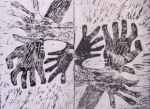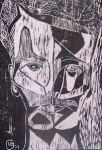Childhood in Brazil
 Crystal Palace Crystal Palace
|
Later in life I often pondered about the irony of destiny since without Hitler's racial laws my parents would never have met and I would have never been born.
Until the "Law for the Protection of German Blood and Honor", forbidding any contact between Jews and non-Jews in Germany was legislated and implemented, my mother, born Ruth Irene Pick 1915 in Hamburg, had a Russian boyfriend and my father, Klaus Ulrich Meyer born 1912 in Berlin, had a German Gentile girlfriend. They met in 1935, the year the laws came into force and married in 1937 in Berlin, where my mother's parents and my father's mother lived. After the wedding they moved to Cologne where my father who had studied mechanical engineering like his father before him, could not find work in his profession anymore; eventually he was hired by a certain Mr. Adler, the Jewish owner of a mechanical calculations office and he managed to keep the job until their immigration to Brazil, two years later.
Up to the time they were forced to immigrate, my father like so many other German Jews, believed that Hitler would not last long, that he would not remain in power more than a year. Furthermore, he was convinced that since he was the son of a captain who had fought and fallen for his country in Verdun during WWI and who had been a respected mechanical engineer with the Siemens Company, he had little to fear about.
 Fear Fear
|
Since my mother could not produce it, they took my father with them. Terrified, my mother run down the stairs to look through the garbage cans in the basement, desperately hoping to find the pieces of paper and ironically as this may sound, that this rather incriminating order would help her release my father from prison. The fact that she did find the pieces, managed to put them together again and that under "these circumstances" the Gestapo accepted the paper and let my father go the same day, was a miracle made possible by G-D alone.
On her way to the local police station that day, she entered the post office and sent an urgent telegram to my father's cousin who was living in Brazil and asked him to help her and my father to leave Germany.
Arthur Seligmann, who was still functioning as German honorary consul for the Third Reich, in Belem do Para, Brazil, arranged for valid visas for my parents and on December 28th, 1939, their 2nd wedding anniversary, they arrived safely in Rio de Janeiro. In 1941 my mother managed again with Arthur Seligmann's help to get my paternal grandmother, Flora Meyer, out of Berlin and bring her to Brazil way of Barcelona.Most of my relatives including my father's sister Ellen had left for England already in 1933.
 Two Faces Two Faces
|
After a couple of years my parents had successfully overcome their adjustment difficulties and eventually settled down in their new home in Ipanema, a southern district of the city of Rio de Janeiro. My father was lucky to immediately find a good job in the northern district of Rio as a mechanical engineer with the Brazilian Aircraft Industry, and in 1943 I was born, followed by my brother Ronaldo in 1947. His experiences in Nazi-Germany led my father to the idea that if he had us baptized, we would never again suffer persecutions because of our religion and origin. Thank G-D my mother would not hear about it and so my Jewish identity was not taken away from me. Like most German immigrants, my parents tenaciously clung to everything German and educated my brother and me in its custom and culture. They trusted that my brother and I would learn Portuguese soon enough with our friends and in school and so German was the only language spoken at home. Still, growing up with two languages was not easy, the fact that sometimes my class mates would make fun of my German accent, added to my misery.
Our parents taught us to be tolerant, open-minded and to regard ourselves as cosmopolitans, their deepest concern was that we should grow up to be good-hearted and kind human beings and that we learn to respect them and other people as well.
Religion was the only issue they would rather not talk to us about; they only told us to listen to our hearts and in time make our own decisions.
There were some German Jewish families among their many friends and thanks to the Weil family from Stuttgart, who would sometimes invite me to spend the weekend at their home and whose daughter Mariana remained my friend to this very day, I got the chance to experience Jewish religion and Jewish tradition for the first time.
When I was six and my brother three years old our family moved away from Rio de Janeiro to the mountains, to the old and lovely Emperor's city of Petropolis, in search of a better climate for us children to grow in, and a wider house with a garden. In 1942 the famous Austrian Jewish author Stefan Zweig and his second wife Lotte, unable to find anywhere peace for their tormented souls and in view of the continuing destruction of Europe through Nazi-Germany, committed suicide in their house in Petropolis.
 Landscape of my Childhood Days Landscape of my Childhood Days
|
All these years my parents mentioned neither a word about Nazi-Germany to us nor did they speak to us about Judaism and Jewish tradition. What mattered to them was that their children grow up to be decent people and that we should follow their advice and example as good as possible.
They always kept worries and troubles as far as possible away from us and therefore the world my brother and I lived in, was like a lovely dream world; school was the only reality we were allowed into. But of course there we talked about what was going on around us, with our fellow students.
Through the years I became more and more interested in Judaism and what my religion means to me, all I know about it and relate to in our tradition today, I have searched for and discovered by myself, all my mother ever told us about our religion is that the day begins for us Jews in the evening, when the three first stars show in the sky and some thoughts from Maimonides. She was fascinated by Greek and Roman History and Mythology; read Thomas Mann, Hermann Hesse and Aldous Huxley. Culture was very important to her and she expected us at least to know and be able to quote from Goethe and Schiller by heart as well as to be familiar with classical music and visit the theater once in a while.
 Tree of Life Tree of Life
|
Aunt Ellen did not only teach me how to tie my shoe laces; she was the one who ever really taught me anything about Judaism in our family. She would read to me the text of the prayers the choir would be singing that day and explain their meaning to me.
To this day for Rosh-Ha-Shana and Yom-Kippur I use Aunt Ellen's Machsor (Prayer Book), I can still see the faded rouge stain her lips left on one of the pages.
